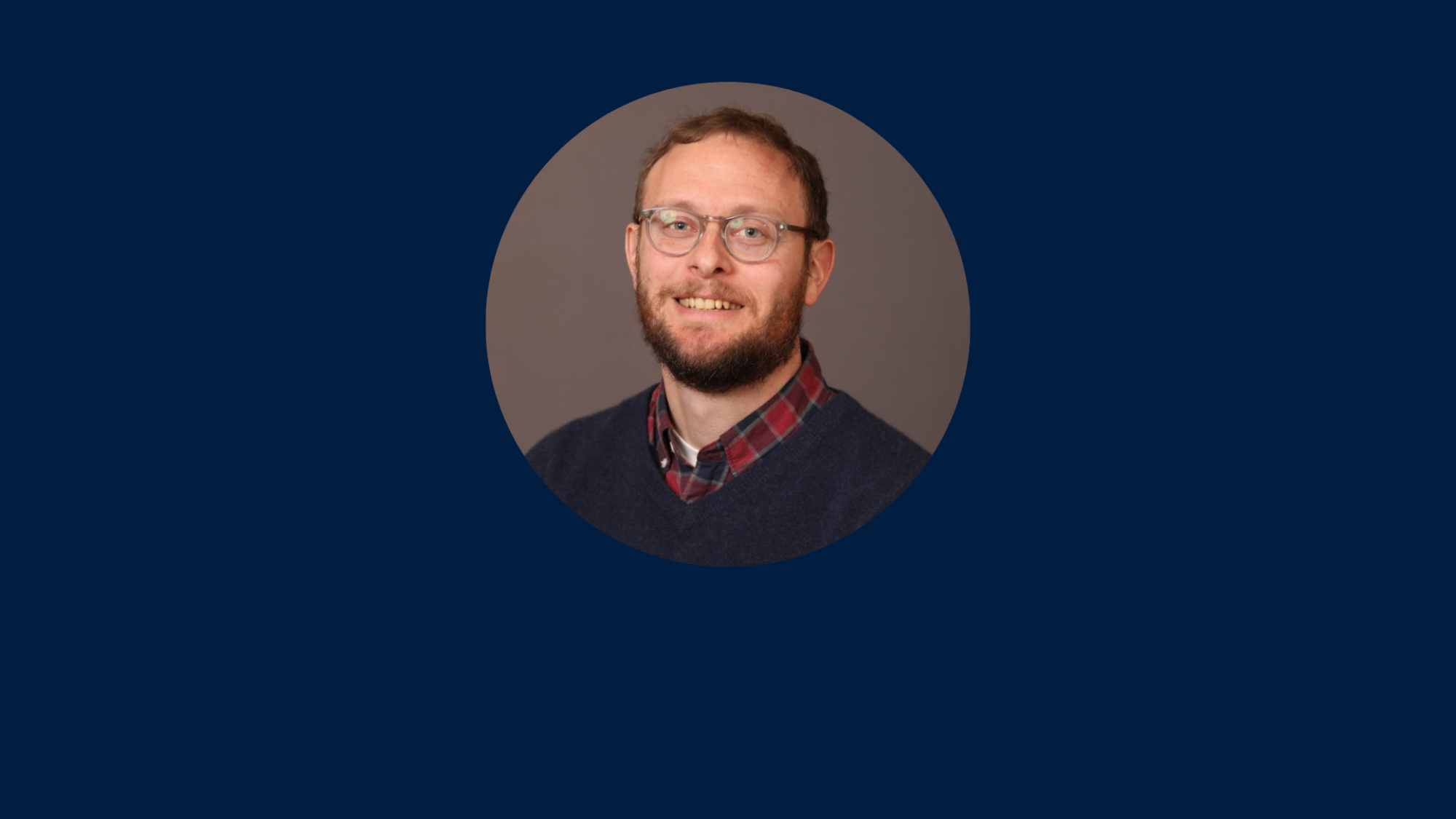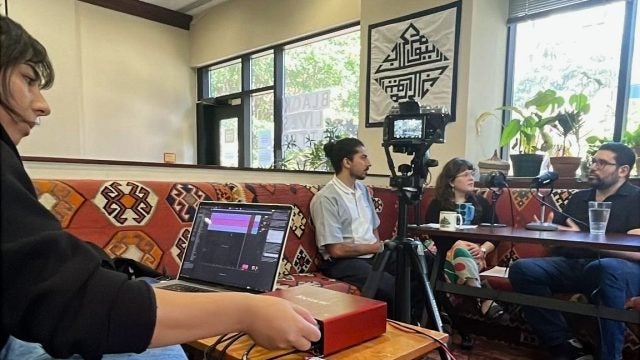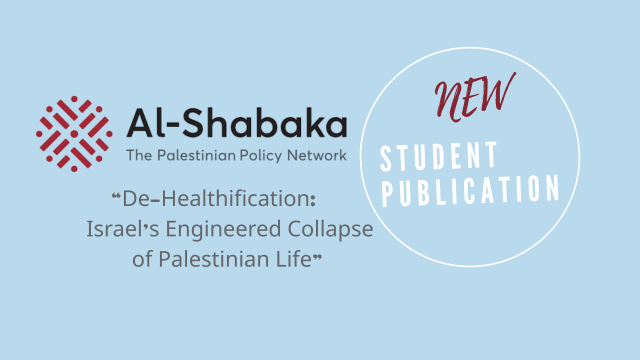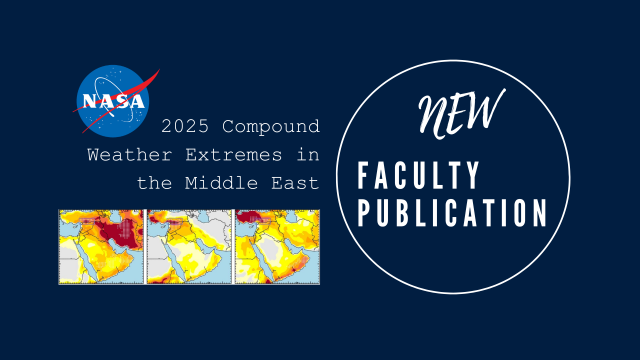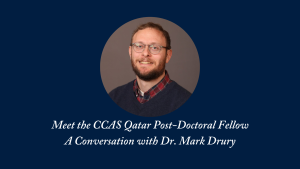
Dr. Mark Drury, the 2022-2023 Qatar Post-Doctoral Fellow at CCAS, is a political anthropologist and scholar of decolonization in northwest Africa. His research examines how unresolved tensions between anticolonial and nationalist political projects continue to shape forms of political mobilization and belonging across Western Sahara, Mauritania, Morocco and Algeria.
Tait
What inspired you to pursue the study of decolonization in Northeast Africa? In particular, anti colonial projects impact on political mobilization?
Drury
I am really pleased to be here because it is a regional study center that both overlaps with my work and challenges and expands the connections that I can make, which is part of what motivated my research into decolonization. I went to Morocco first as an undergraduate and really wanted to learn more. But as I began to think and learn more about the relationship between knowledge and power, I also became interested in the role of area studies in reflecting certain power relations. In particular, having spent time in Morocco, I began thinking about its accessibility to American students because of US. Moroccan relations. This was reflected in more knowledge production around the country in English, I’d say relative to Algeria and Mauritania. And so I went from thinking about learning more about Morocco to wanting to learn more in relation to Morocco, but through methods that challenged national units of study. So in my Master’s research, that led me to look into and explore sub-Saharan migration in Morocco, a topic that is inherently transnational and transregional. When I got to the PhD program in Anthropology at the Graduate Center at City University of New York, I began to think more about this Western Sahara conflict which just explodes and challenges nationalist categories of any kind – Moroccan, Mauritanian, Sahrawi- and necessitates an approach that is regional, transnational and even transregional in certain ways. Through that, I sought to undertake research and study on themes and topics that defy methodological nationalism.
Tait
Can you talk a bit more about what you’re currently researching and currently working on? What’s your day to day look like as far as the work that you’re interacting with now?
Drury
I am here working to develop my dissertation into a book manuscript. The dissertation explores the political history of decolonization in Northwest Africa through a series of political projects animated by the prospect of decolonization that center around Western Sahara. These include the Moroccan Liberation Army in the 1950s, anti-imperial movements in the 1970s that were in Mauritania, what was then the Spanish Sahara, as well as Morocco, and more recently the role of human rights in trying to draw the attention of the international community to Moroccan Occupied Western Sahara. I also just came back from a research trip to Mauritania that picked up on a thread adjacent to dissertation research around a movement in the 1970s known as Harakat al-Kadihin, the Workers or Toilers movement, in Mauritania to understand the role of certain Leftist Third Worldist concepts in animating this movement and the circulation and translation of these concepts transnationally and then into Mauritania in the late 1960s and 1970s. That is the ongoing research. I will be going back there in December while also working on the book manuscript.
Tait
In what ways does your work in the case studies you consider exemplified trends of decolonization on a larger scale?
Drury
Typically 20th century decolonization is often understood as the end of foreign European rule across broad swathes of Africa, Asia and the Middle East, now often referred to as the Global South. The typical framework for understanding decolonization makes sense of that process by looking at the relationship between the colonizer and the colonized,the emergence of anticolonial movements that adopted a nationalist ideology and, as the narrative is typically written, this resolves into the independence of the postcolonial nation state. Western Sahara, however, does not fit that narrative. Therefore, it requires a view of decolonization that unfolds across a set of different temporalities and involves multiple actors including: Spanish and French colonialism, Moroccan, Mauritanian, Sahrawi, and Algerian actors, and it involves a set of different local, regional, and global scales. That complexity is what interests me.
I think by looking at decolonization as a complex process that has unfolded over a longer set of time or period of time, involving multiple actors, not just colonizer and colonized,it helps to inform geopolitics in the present when there is a great deal of discussion about a multipolar world or the dissolution of a post World War II order potentially. This complexity helps us to understand that there are certain tensions in the global political order established after World War II but never really resolved, and that these tensions continue to play out in the Western Sahara conflict today.
Tait
Why did you pursue a PHD and a career path in academia versus joining a research center out of your MS or MA program? What does academia give you?
Drury
It gives you a certain amount of time to think deeply and read widely, which once it’s over, you realize it is precious, valuable, and almost unique to do so in a stimulating environment where you get to be around, think, and constantly talk with fascinating people. Meeting wonderful, interesting people is the most important part, I think, when you say why academia and not other realms. It also enables – in particular anthropology and, say, Middle East studies – to think critically about questions of political judgment.
Questions like the relationship between politics and ethics and what it means to respond politically and to develop a certain judgment about events unfolding around us. That while also considering the moral and ethical relationship for the complexity of how people behave and respond certain ways and how I may develop my own behaviors and responses in relation to this political realm that might be quite different from others. That is such a deep question that goes beyond policy that I will never fully resolve. I think I go into academia in part to try and grasp and understand political judgment. For instance, last week, there was a really fascinating book talk on UN intervention in Libya, which happened during my PhD studies. And I remember talking with people about it, reading really thoughtful responses, realizing that in many ways my response was wrong. But, I relied on other people and in turn, developed my own sense of judgment through reading and thinking carefully and critically with and among others. That is the quintessential example of the relationship between doctoral studies and understanding the world around us.
Tait
Can you talk about what your academic year looks like? I know you’d be teaching a class in the spring, so I’d love to hear a bit more about that.
Drury
As I mentioned earlier, I’ll be working on the book manuscript on the histories of decolonization in Northwest Africa revolving around the Western Sahara conflict through several moments from the 1950s to the present. I’ll be continuing research in Mauritania that I described, and then I’ll be teaching a course on the Sahara that begins with this recognition that the Sahara is often reduced to somewhat simple metaphors, like a barrier or a bridge. In order to move beyond those metaphors, the course explores the region in its complexity through several topics or themes, including authority. So that’s a way of thinking about different forms of authority and how they have been transformed by and through not only colonialism and modernity, but also decolonization. We will be looking at different political formations that emerged in and across the Sahara then we will be looking at mobility, which is extremely complex and really important to the region. This includes contemporary transnational migration, but also different ways in which trans-Saharan trade has been understood through different practices and modalities of movement. We will also be looking at hierarchies within certain Saharan social formations. The Sahara is often seen as a frontier in constructions of race within and in relation to Arab identities in North Africa and Northwest Africa, so we will pay careful attention to those. Lastly, we will situate how the Sahara is understood as a specific environmental and ecological region. I think in the Middle East and North African Studies, that the question of region is always unavoidable. The Sahara is a region that is both overlooked or is treated as a margin dividing other regions. It helps to center the question “what are area studies good for?”
Tait
What is one thing you would like the CCAS community to know about you?
Drury
Thinking about the Sahara, one would be that it is still where I had my favorite breakfast ever, made up of locally made bread, camel’s milk, sheep’s butter, and then honey from Mali. So it was both local and transnational, which is quintessentially Sahara. I think another thing is that I hear that dancing is popular here, and right now I am into a song called Badala Zamana by an Algerian singer known as Zohra [who now goes by the name Dihya]. I’m eager to dance to that at one of the [CCAS] dance parties.
Coco Tait is the Events and Program Manager at CCAS.
